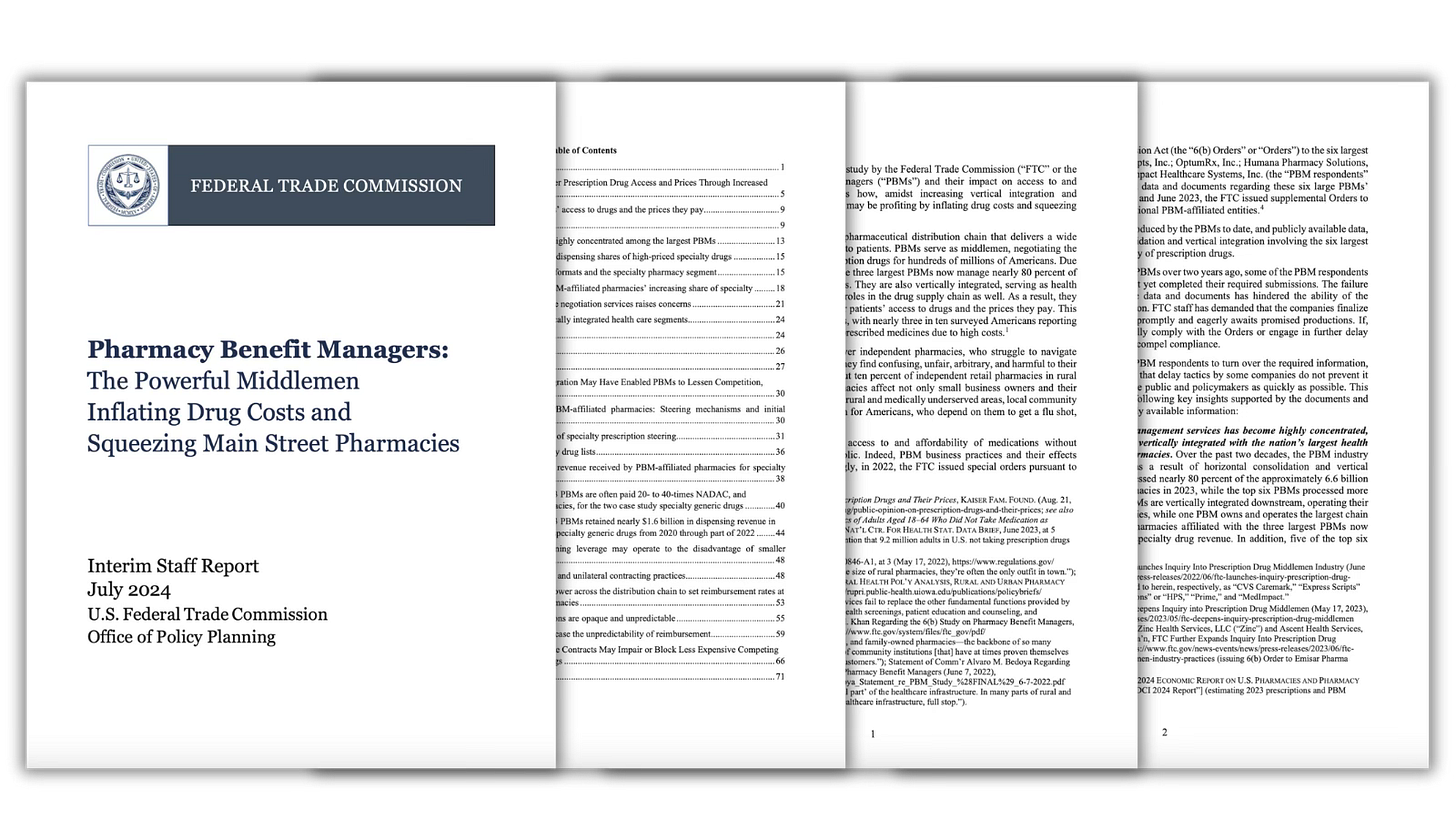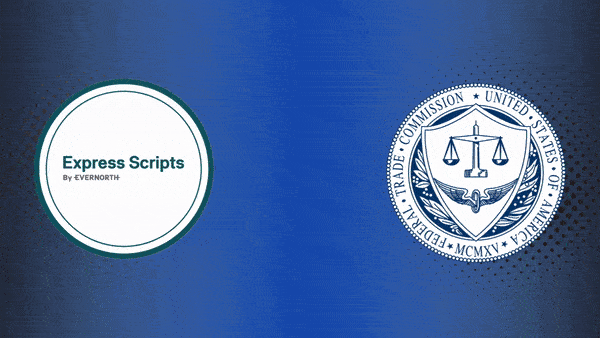BREAKING: As we were getting this story ready for publication, the FTC announced this afternoon that it is suing Big Insurance’s biggest pharmacy benefit managers, including Express Scripts (ESI), for inflating the price of insulin. This is from the agency’s press release:
“Millions of Americans with diabetes need insulin to survive, yet for many of these vulnerable patients, their insulin drug costs have skyrocketed over the past decade thanks in part to powerful PBMs and their greed,” said Rahul Rao, Deputy Director of the FTC’s Bureau of Competition. “Caremark, ESI, and Optum — as medication gatekeepers—have extracted millions of dollars off the backs of patients who need life-saving medications. The FTC’s administrative action seeks to put an end to the Big Three PBMs’ exploitative conduct and marks an important step in fixing a broken system—a fix that could ripple beyond the insulin market and restore healthy competition to drive down drug prices for consumers.”
Let me take you behind the scenes at Cigna to provide a glimpse into the reasoning behind the lawsuit the company filed this week against the Federal Trade Commission. Having been a part of the Legal and Public Affairs team there for 15 years, reporting to the general counsel for much of that time, I can assure you that the decision to sue the FTC over an interim report it released more than two months ago about how big insurers’ pharmacy benefit divisions are harming both patients and pharmacists, was borne out of equal measures of confidence and fear.

CEO David Cordani would have had to sign off on pulling the trigger, and he likely proposed the idea in the first place. I doubt this would have been something the many lawyers in the building and on retainer would have suggested. And I’m pretty certain the PR team would have argued against it but ultimately had to get on board.
If I still led that team, I would have reminded Cordani of the “Streisand effect.” Twenty years ago, Barbara Streisand’s lawyers sued a photographer to keep aerial photos of her Malibu home from being published. The lawsuit had the opposite effect. Before it was filed, the photo had been downloaded only six times, including two times by Streisand’s lawyers. After numerous media organizations reported on the suit, it was downloaded 400,000 times in the first month. And it now has its own Wikipedia page.
Similarly, Cigna’s lawsuit (filed under the name of its enormous pharmacy benefit manager, Express Scripts) generated a huge flurry of media attention, including a story in the Wall Street Journal. I would argue that more people are now aware of the FTC’s report, which accused insurers’ PBMs of inflating drug costs and harming independent pharmacies. The suit calls the FTC’s findings “false and defamatory,” while attempting to paint PBMs as the unsung heroes lowering prescription drug prices. To those who know this world, it’s a comical move, but it’s not surprising given what’s at stake for my old employer.

When I was there, Cigna was still primarily a health insurance company, or to be more precise, a third-party administrator of employer-sponsored health insurance plans. The vast majority of its revenues and profits came from that business. No more. As I’ll explain below, Express Scripts and the division that houses it (Evernorth) contributed more than 80% of the company’s total revenues.
As HEALTH CARE un-covered noted previously, the FTC report highlighted just how concentrated the PBM market has become. According to the agency, just three companies — Express Scripts, CVS Caremark, and UnitedHealthcare — control nearly 80% of the market. This kind of dominance has given them the power to steer patients toward high-cost drugs, including insulin, with little transparency. The report’s findings were the culmination of a two-year study that left no doubt about the role PBMs play in driving up costs. Express Scripts, on the other hand, claims the FTC relied too heavily on drugmakers’ input and ignored PBMs' evidence to the contrary.
As the FTC inches closer to suing the largest PBMs for anticompetitive behavior, Cigna is playing both defense and offense. Cigna bet the farm on its PBM business when it purchased Express Scripts in 2018 and will throw everything at the wall to protect its new cash cow, especially considering the company’s decision to bail out of the Medicare Advantage business, which has become a huge cash cow for its major competitors. Ed Weisbart, who served as Express Scripts’ chief medical officer before Cigna bought the St. Louis-based company, wrote in HEALTH CARE un-covered that:
It’s true that PBMs negotiated lower prices than the manufacturers wanted, but we typically kept most of those rebates along with a percentage of the total cost. Ultimately, for us to make any money, patients had to spend money at a pharmacy. No drugs, no margins or profits. Our motives were murky at best.
Cordani painted a rosy picture of Express Scripts and its potential for future growth at the company’s investor day and JP Morgan health care conference this summer, and he is under intense pressure to achieve that growth.
During the first six months of this year, Evernorth contributed $95.8 billion to Cigna’s $117.8 billion in total revenues. Cigna Healthcare, the health plan division, contributed just a little more than a fifth to the total. During the same time frame in 2017, the year before Cigna bought Express Scripts, the company’s health plan operations contributed more than 70% to total revenues of $20.6 billion. Here’s another way of looking at the change in Cigna’s financials over the past seven years: Its revenues have more than quintupled since it brought Express Scripts under the corporate umbrella.
Cordani has a big personal stake in making sure Express Scripts’ profits aren’t constrained by meddling lawmakers and regulators. Of the $21 million he was paid in 2023, only $1.5 million was in salary. The rest came in stock in one form or another. That means that more than 90% of his total pay depends on how well the company meets its goals, primarily its goal of rewarding shareholders and meeting Wall Street’s profit expectations.
As a significant shareholder in the company, he also benefits personally when Cigna buys back its own shares of stock. Stock buybacks, which were illegal until the 1980s, are a gimmick many companies use to boost the value of each share of stock. Late last year, Cigna announced that it will be spending up to $10 billion of the money it gets from its customers to buy back its own shares. That is a very nifty way to increase Cordani’s net worth.
As important as Express Scripts is to the company’s future fortunes, the health plan business is still exceedingly profitable despite its shrinking contribution to revenues. During the first six months of this year, Cigna Healthcare’s adjusted pre-tax profit margin was 9.6% compared to Evernorth’s 3.1%. Even though Cigna Healthcare is much smaller than Evernorth, it is valuable not only because of the high margins but also because the company is able to steer its health plan members to its PBM and the other companies within Evernorth. That, folks, is the true value of vertical integration in this industry. No credible independent studies have shown that vertical integration in health care brings down costs or improves access to care, but there is an abundance of empirical evidence – in Big Insurance’s quarterly earnings reports – that it benefits shareholders.
In fact, vertical integration has served to boost Cigna Healthcare’s profit margins, which have expanded from 7.4% in 2017 to 9.6% in 2024. Cigna and its peers in the industry have also made access to care more difficult for their health plan enrollees, largely through higher out-of-pocket demands and higher rates of claim and treatment denials through more aggressive prior authorization requirements and the use of artificial intelligence.
In a bombshell of an investigative report last year, ProPublic and Capitol Forum reported that one Cigna medical director denied 60,000 claims in one month through the use of an AI program that enabled her to reject thousands of claims at once without even opening the claim files.
Back to that lawsuit against the FTC. The agency’s report, while labeled “interim,” is a critical step toward exposing the opaque business practices of Express Scripts and other big PBMs, and Cigna clearly is trying to intimidate the FTC and to make it spend millions of taxpayer dollars defending itself against the litigation. I also suspect it is hoping UnitedHealth and CVS/Aetna will file similar suits to block a final report and lawsuits the FTC might file against the big players in the PBM business.
At the same time Cigna has turned its army of lawyers against the FTC, it is also spending huge sums of dollars on a charm offensive to try to persuade folks inside the DC beltway that it is one of the good guys fighting the good fight to save Americans money on their prescriptions, despite evidence to the contrary. Last week, Express Scripts sponsored the Washington Post’s Health 202 newsletter. The ads featured the requisite multicultural-looking woman, smiling in apparent gratitude, above the headline, “Express Scripts isn’t a middleman. They’re an advocate.”
Cigna and other big PBMs are behind wall-to-wall cable TV ads airing in Washington as part of this charm offensive, which is aimed primarily at members of Congress who increasingly seem determined to pass bipartisan legislation to reform the industry. Several bills have been introduced by both Democrats and Republicans to do just that, and there is momentum to include at least some reforms in a year-end spending bill. Vocal critics of PBMs include Rep. Buddy Carter (R-Georgia), who has said he wants to see these vertically integrated companies “busted up,” and Rep. Jake Auchincloss (D-Massachusetts) who tweeted this after news of the Cigna/Express Scripts lawsuit against the FTC.
Whether Express Scripts’ lawsuit and the industry’s bifurcated campaign of intimidation and charm will succeed remains to be seen, but one thing is clear: the massive conglomerates should be focused more on providing Americans the medicines that are prescribed to them by their doctors without going broke, than whining and bragging to protect profits.





During Fireside chats the message is they want to help Americans get better. Meanwhile back at the fort it’s been shown that morbid obesity and being tied to a desk most of the day leads to many employees having diabetes, hypertension which leads to chronic kidney disease and heart problems and a host of other problems. Yet they won’t authorize weight loss medication like monjaro. They want to keep nickel and dime the problem and cause your worth more to them in meds and office visits but when you really get sick than they deny your hospital stay.
Mr. Potter, a great article that I posted over to LinkedIn. It is incredible to me with what has happened in the vertically integrated market we exist in today, and the greed becomes even greater.
I read all of your articles and anything pertaining to big insurers and their affiliated PBMs goes to LinkedIn with my own added comments.